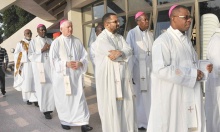“As we launch the golden jubilee year of SECAM, there are a lot of troubling situations and conditions of need that characterise the continent of Africa, one of which is the temptation of materialism,” the second Vice President of the Symposium of Episcopal Conferences of Africa and Madagascar (SECAM), Bishop Sithembele Sipuka of Mthatha (South Africa) said Sunday, July 29 at the launch of SECAM Golden Jubilee in Uganda.
“Sadly, this crude materialism,” Bishop Sipuka cautioned during his homily, “is even manifesting itself among the pastoral agents, those at the forefront of missionary work.”
On Sunday, July 29, Bishops representing various regional and national conferences and other Church institutions in Africa graced the launching of SECAM Golden Jubilee at Sacred Heart Cathedral, Lubaga in Kampala, Uganda, during a solemen Eucharistic celebration attended by a congregation of over two thousand including priests, religious men and women and lay faithful.
Bishop Sipuka expressed concerns about the seeming loss of traditional African values such as love, sacrifice, and service.
“The values of being a community of love, self-sacrifice, finding joy in serving others and having God as enough for us are gradually being replaced by individualism, self-seeking, love of money, power and comfort,” the South African Bishop lamented.
Africa that was described as the “spiritual lung of humanity” by Pope Benedict XVI because of having growing communities of witnesses of strong faith seems to be drifting away from this characteristic and “gradually becoming an infected lung,” Bishop Sipuka observed.
“The source of our joy is gradually shifting from the Gospel, the SECAM second Vice President said and explained, “Perhaps, that is why the hunger for corruption and power, with the consequent physical hunger and poverty for most of the people, have become a major characteristic of Africa.”
Bishop Sipuka based his homily on readings of the day, with the first reading (2 Kings 4:42-44) and the Gospel reading (John 6:1-15) presenting situations “of need to people who feel hopeless and even pessimistic about their ability to do something about their situation.”
The Church leader encouraged Church members in Africa including pastoral agents to take the example of the small boy who sacrificed his five barley loaves and two fish, ingredients for the miracle of feeding of a multitude.
“The lesson here is that the smallest cooperation with Jesus and willingness to give the very little one has, be it money, time, a smile, attention or a hug, can produce a miracle, even in our time,” Bishop Sipuka said.
Below is the full text of Bishop Sipuka’s homily at the launch of SECAM Golden Jubilee Celebrations
LAUNCH OF THE SECAM GOLDEN JUBILEE YEAR
Sacred Heart Cathedral, Lubaga, Kampala: Sunday 29th July 2018
Bishop S. Sipuka: 2nd Vice President
Bishop of Mthatha (South Africa)
“There is a small boy here with five barley loaves and two fish; Jesus took the loaves, gave thanks, and gave them out to all as much as was wanted.” (Jn 6:9-10)
Today’s first reading and the Gospel present a situation of need to people who feel hopeless and even pessimistic about their ability to do something about their situation. In the first reading, the prophet Elisha says to his servant “give the twenty barley loaves and fresh grain to the people to eat” But his servant replied, ‘How can I serve this to a hundred men?’
In the Gospel, Jesus and his disciples are faced with a similar situation of a very large and hungry crowd of people in a deserted place, and with totally insufficient means to provide food for them, both in terms of money and the actual food they had. And so, one can understand Philip’s surprise, if not also a slight annoyance, when Jesus asked where they could buy food to feed the people. Philip points out what he thought was obvious to any thinking person, that ‘Two hundred denarii would only buy enough to give them a small piece each,” don’t you understand that? Not fully convinced of it himself, Andrew mentions a possible solution, that “there is a small boy present here with five barley loaves and two fish”, but adds with a sense of pessimism “What is that between so many?’”
The servant of Elisha, Philip and Andrew have all given up and feel there is nothing that can be done about this situation of need. Twenty loaves of bread are nothing to feed a hundred men, two hundred denarii can only get a crumb for the multitude of people, and five barley of loaves is as good as nothing for the big numbers of people. In fact, in Matthew’s version of this scene, the disciples, looking the limited means they had, ask Jesus to let the people go to fend for themselves, “Send the crowds away so they can go to the villages and buy themselves some food”, (Mt 14:15). There is nothing we can do.
But what does Jesus do? He takes the five loaves from the boy, gives thanks over them and lets the disciples distribute them to the people. The result is well known, over 5000 men, not counting women and children were fed, and there were twelve baskets of left overs. One generous person became the solution for this problem. One person’s generosity gave Jesus the opening he needed to rescue the situation.
The lesson here is that the smallest cooperation with Jesus and willingness to give the very little one has, be it money, time, a smile, attention or a hug, can produce a miracle, even in our time.
We face daunting challenges in Africa which can be overwhelming. But today, as we launch the SECAM Golden Jubilee Year, we are encouraged by what we have heard from today’s readings. We are encouraged not to despair but generously do the little we can, and let God, as Jesus did with the few loaves of bread, do the rest. As John tells us, “he himself knew exactly what he was going to do” when he asked his disciples about how to get food. But Jesus could not have done what he did without the Apostles playing their part. On the other hand, without the presence of Jesus, the crowd would not have been fed. Without the presence of the small boy and his few resources the crowd would not have been fed.
In short, the Lord does not work in a vacuum; he needs our cooperation. As we launch the 50 years of the existence of SECAM, the Lord knows what he is going to do in the next 50 years, but needs our cooperation, he wants to do it with us. That is how much he respects us.
Jesus has seen the various circumstances of need, problems and challenges that we shall face during this Golden Jubilee and beyond, and he is saying to us; “don’t shy away from these needs, solve these problems, address these challenges”. It will be self-defeating to react like the servant of Elisha or like Andrew and Phillip, saying “this problem is too big for me, there is nothing I can do”. We should rather respond like the boy who gave away the little that he had, and Jesus did the rest.
The hunger that Jesus satisfied today is a metaphor for various forms of hunger such as hunger for food, for company, for shelter or a home in case of refugees and displaced people. It could be hunger for friendship, or for social justice. As we go back to our regions, our countries, our conferences and to our homes, let us identify, both at a personal and collective levels, the hunger that is there, which the Lord is wanting us to take care of with our cooperation. Jesus does not want anybody to leave from here undermining oneself that there is nothing one can do.
In the context of SECAM, as Archbishop Palmer Buckle habitually prefaces his interventions, “permit me”, to suggest a couple of hungers that the Lord can satisfy with our cooperation. There are many more that one could mention, but time would not permit that.
Let us work against materialism and corruption
As we launch the golden jubilee year of SECAM, there are a lot of troubling situations and conditions of need that characterise the continent of Africa, one of which is the temptation of materialism. While it is true that compared to Europe, Africa still has strong faith, which led emeritus Pope Benedict in his Post-synodal Apostolic Exhortation, Africae Munus, to call Africa the “spiritual lung of humanity”. Unfortunately, Africa is gradually becoming an infected lung. The values of being a community of love, self-sacrifice, finding joy in serving others and having God as enough for us are gradually being replaced by individualism, self-seeking, love of money, power and comfort. The source of our joy is gradually shifting from the Gospel. Perhaps, that is why the hunger for corruption and power, with the consequent physical hunger and poverty for most of the people, have become a major characteristic of Africa.
Sadly, this crude materialism is even manifesting itself among the pastoral agents, those at the forefront of missionary work. Pope Francis, who is not afraid to tell it like it is, in his encyclical “The joy of the Gospel”, expresses sorrow about “many pastoral workers, including consecrated men and women” who are concerned more about “their personal freedom, which leads them to see their work as a mere appendage to their life and relaxation” (78), than about evangelisation. Pastoral workers “who fall into a lifestyle which leads to attachment to financial security, or to a desire for power or human glory at all cost, rather than giving their lives to others in mission” (80). If we are honest, we will realise that the Pope here is not only talking about Europe, this truth applies to us in Africa as well.
At the dawn of the next 50 years of the existence of SECAM, we are not to despair about this situation, but to continue with the little efforts we are making to work against corruption and inefficiency. We must carefully select and form the next generation of pastoral agents. The Lord will multiply these efforts and produce for us more good priests and religious and pastoral workers who will build Africa to be a truly healthy lung for humanity.
The clarion call of theme for the Golden Jubilee is to “proclaim Jesus Christ your Saviour”. We are called to proclaim him who is our joy, him who is our fulfilment and satisfaction. Yet, we are living in an age where we are being lured to find our joy and fulfilment in other things other than the values of Jesus Christ. Those who endeavour to live according to his values, are viewed as fanatics and made to feel unreal. This is particularly true for young people, who are being influenced by thoughts and ideologies that are contrary to Christ. How can we overcome these challenges? Pope Francis exhorts us to find joy in Jesus, which enables us to have a relationship with him, especially for those of us who are pastoral workers, who are specially called to lead people to Jesus.
Like Jesus let us help people to fight the real physical hunger
The presence of the Church in the whole of Africa, which is not only present but also growing, and which is not only growing but influential among people has made the Church in Africa, and therefore SECAM a body to reckon with. For this reason, because of our continental strength we can engage with the powers that be and other people of good will around the world. For this reason, we can engage with governments at national, regional and continental level on broad issues of human rights and environment. Thanks to our strength and principles, we can engage governments on issues of justice, economy, politics and other social concerns.
Presently, there is a problem of land grabbing, which is threatening livelihoods of many people. Yet even as there is a problem of land grabbing, most of us have a small piece of land behind our houses that we can use to grow basic food and feed ourselves, but most of us do not. We have been conditioned to buy instead of fending for ourselves, and thereby retaining our dignity. Being able to feed yourself is the beginning of development. As we enter this jubilee year, let us make the effort to feed ourselves with the little means and small piece of land we have, and do together what we cannot do on our own.
African Bishops invited to bring forward their five barley loaves
Finally, in relation to us as bishops of SECAM, today’s Gospel is teaching us that while we are not able to do everything we want to do because we do not have funds, if we combine the little monies we have, we can do wonders. If each bishop can make his contribution of five barley loaves every year in the form of five hundred dollars as a levy to SECAM, we would enable SECAM to do a lot more than it has been able to do in the past fifty years. As you know, each time we are to hold an event, we must go begging, because we do not all contribute our five barley loaves. We tend, for the most, to run programmes that donors want, and not those that we want to run because we do not have our own funds.
In this year of the Jubilee, we are invited to all bring forward our five barley loaves and allow the Lord, together with our cooperation as African bishops, to do the programmes that we think will take the Church of the African continent forward. This is not to say that we will not need the assistance of our partners and the larger church anymore. What it means is that when we bring our five barley loaves, the word partner will begin to have its true meaning, because now it is said out courtesy to avoid offence, but in truth we are not partners, we are beggars because we do not all bring our barley loaves to the party. Let us bring our few barley-loves and gain our dignity.
These are some of the hungers that will be eliminated, during and after the Jubilee if we all come on board, giving the little that we have. The Lord will surely add to our efforts.
Being in the place where 50 years ago SECAM was founded, Pope Paul VI, in his homily during the closing mass of the Symposium of Bishops of Africa, he challenged us to be missionaries to ourselves. He went on to give us sound advice, that the African Church, being a young Church, needed to embrace the two great forces that Christ had established to build up his Church, namely, the Hierarchy (which gives the Church its visibility) and the grace of the Holy Spirit, and wished that the Church in Africa will let these two forces work together with great intensity to move the Church in Africa forward.
“There is a small boy here with five barley loaves and two fish; Jesus took the loaves, gave thanks, and gave them out to all as much as was wanted.” (Jn 6:9-10). Let eacn and all bring alone one’s five barely loaves forward and together with Jesus take the African Church to further hieghts
AMEN


